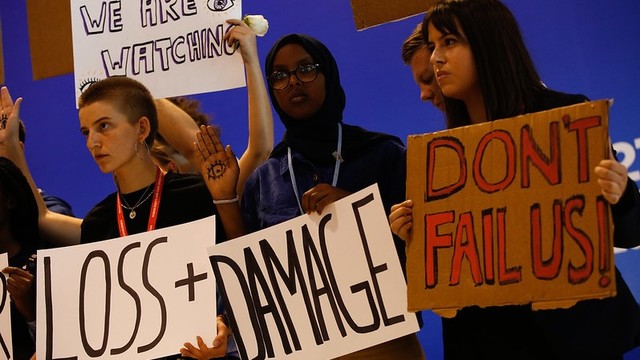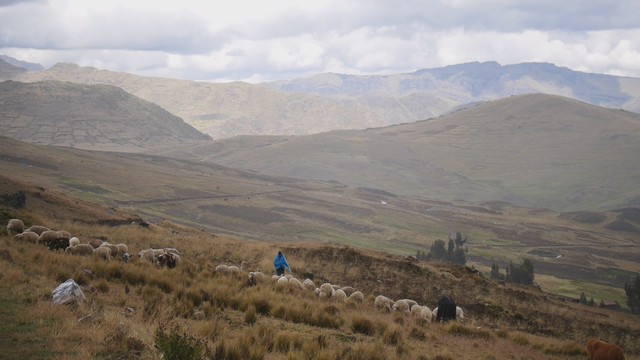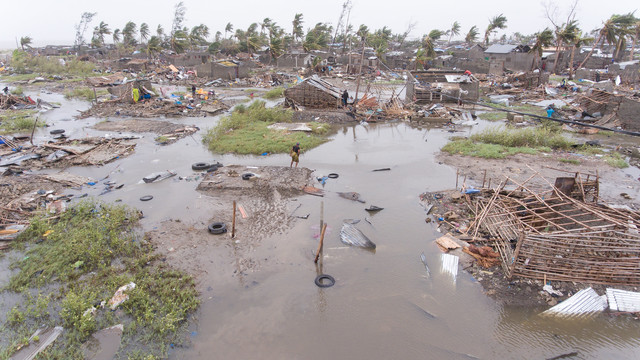Achieving an inclusive approach to the Global Goal on Adaptation
The Glasgow-Sharm El Sheikh work programme is designed to advance action on the Global Goal on Adaptation. It’s crucial that civil society and local voices are incorporated to ensure the process is most inclusive. An IIED webinar explored how this could be achieved in practice.



Women fetch water in Kitumbeine, in the Arusha region of Tanzania (Photo: Lodrick Mollel, Tanzania Natural Resource Forum/Maajab Films)
The Global Goal on Adaptation (GGA) established under the Paris Agreement drives collective ambition on climate adaptation. Yet progress on operationalising the GGA has been slow since it was proposed in 2013 (PDF).
At the 2021 UN climate summit (COP26), Parties established the Glasgow-Sharm El Sheikh work programme (PDF) (GlaSS) to provide momentum to advance the GGA and translate ambition into action.
Much of the content and format of this two-year work programme still has to be defined – starting with how to enable the participation of non-state actors and other stakeholders working on climate adaptation at the local, regional or national level and ensuring the process is fair and inclusive.
Ahead of the GlaSS work programme’s first official workshop in June, adaptation experts worldwide joined an IIED webinar to discuss how to make the work programme inclusive.
The webinar welcomed commentaries from the outgoing UK and incoming Egypt COP presidencies before exploring panellists' views on the priorities and processes that can ensure the GlaSS – and ultimately the GGA – is inclusive. Panellists included adaptation experts across Africa, Latin America and the Caribbean who have previous or current engagement in climate adaptation negotiations and advocacy.
It is crucial that as formal work on the GlaSS begins, Parties have a clear understanding of concrete actions they can take to incorporate the voices of non-party stakeholders, including civil society, local communities, Indigenous Peoples and experts, and ensure that outcomes are gender and socially inclusive.
Webinar participants agreed that without diverse voices being heard, the GlaSS might remain an empty exercise and that participation of youth and civil society is key. But what does this participation mean more concretely? Throughout the webinar, the panellists discussed what inclusion means practically as part of the GlaSS.
Moving beyond the logistics of participation to capacity building
Webinar participants agreed that genuine inclusivity extends beyond the logistics of participation in workshops. Achieving inclusivity also means that capacity building is needed to engage groups who are doing practical work on the ground but are not formally involved in the process.
Bridging the participation gap of marginalised groups such as Indigenous People and local communities can't be achieved without efforts to reach out and engage them through a bottom-up approach.
One key function of the GGA is to emphasise a shared global responsibility for adaptation: this means there are cascading roles for different actors at different levels.
At the international level, enabling the participation of civil society, academia and local actors in the GlaSS process can be achieved through virtual and in-person workshops. But developing-country representatives must contend with a lack of funding for travel and online connectivity issues, making it difficult to convene people in physical or virtual spaces.
Within countries and regions, Parties could organise discussion forums targeting local actors and community networks to share information and collect different views as part of their preparatory work for the GlaSS.
What would an inclusive GlaSS look like?
In the Caribbean, the Caribbean Community Climate Change Centre (CARICOM) is successfully promoting multi-stakeholder engagement at the regional level. The centre invites NGOs to share views on climate issues and brings together diverse voices. This format could be replicated in preparatory work for the GlaSS through the regional umbrella bodies.
In South Africa, a technical working group on adaptation comprised of grassroots organisations and businesses was set up to unpack key issues on the GGA. The forum informed South Africa’s submission for the GlaSS in April 2022.
Scaling up finance for adaptation
One point that emerged from the webinar was that the four official workshops to be organised under the GlaSS won't be enough to engage all the relevant actors in the process. Parties, therefore, need to maximise other opportunities to enable informal convenings and engage in more community-based consultations.
Parties, especially developing countries, need increased support and finance to build the capacity of actors at different levels and ensure their meaningful engagement. It is paramount that this is provided now, during the GlaSS and in the long-term implementation of the GGA.
Looking ahead
Overall, there is no one-size-fits-all solution to achieving fairness and inclusivity in the GlaSS and GGA. Multiple strategies are required to respond to diverse needs, types of knowledge and differing levels of understanding and mobilisation of local actors.
While Parties have the responsibility to ensure representation within their constituencies, other actors such as the UNFCCC and the international community also have a role in providing such modalities for engagement.
A clear realisation from the webinar was that capacity building is necessary during the GlaSS. As we prepare for the 56th session of the UNFCCC Subsidiary Bodies in Bonn this month, we will look forward to seeing whether a recognition of this need emerges from the first workshop and how Parties will engage different actors to galvanise the GlaSS.
- Watch a recording of the webinar on IIED's YouTube channel




